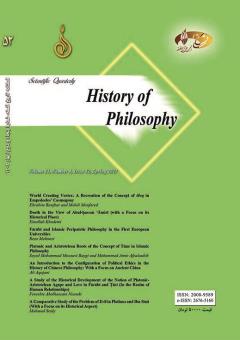World Creating Vortex: A Recreation of the Concept of δίνղ in Empedocles’ Cosmogony
Subject Areas : Geneology of philosophical schools and Ideas
Ebrahim Ranjbar
1
![]() ,
Mehdi Monfared
2
,
Mehdi Monfared
2
1 - MA in Islamic Philosophy and Kalam, University of Qom, Qom, Iran
2 - Associate Professor, Islamic Philosophy and Kalam, University of Qom, Qom
Keywords: Cosmogony, vortex (δίνղ), Zeus, the one, the plural, pre-Socratic, Empedocles ,
Abstract :
Empedocles’ philosophy is conceived as the campaign of a number of hostile forces that are continually in conflict with each other. The traditional view of, for example, ancient dualists is that sometimes strife and sometimes love gain victory in the Empedoclean world. Orthodox thinkers and revisionists did their best to contradict each other. one group believed that these two forces are repulsive, and the other believed that they are attractive. In this paper, it has been tried to reconstruct the internal logic of Empedocles’ poetry in a new way by dealing with the concept of vortex (δίνղ), which both methods of interpretation have ignored. In line with this purpose, in addition to examining the literary logic of the poetry itself, the authors have dealt with the background and consequences of his thoughts before and after him while taking the Aristotelean background of his philosophy into account. Therefore, they initially focus on the point that, in order to understand the nature of motion in Empedocles’ view, one must distance oneself from Aristotelean philosophy. Then they explain the nature of this kind of motion, and finally conclude that vortex is in fact a function that preserves the integration of the one and the plural. This is the same idea that Greek philosophy studied in different ways and considered it as the eternal and pre-eternal motion of the world, the survival of which depends on such a motion. Empedocles highlighted this point by posing the concept of δίνղ.
ابنسینا (1379) النجاة من الغرق فی بحر الضلالات، تصحیح محمدتقی دانش¬پژوه، تهران: دانشگاه تهران.
Aquinas, (1954). Commentaria in octo libros Physicorum, Taurini.
Aristotle, (1924). Aristotle's Metaphysics, ed. W.D. Ross. Oxford: Clarendon Press.
Aristotle, (1951). Physica. ed. W. D. Ross. Oxford University Press.
Bonnechere, P. & Cursaru, G. (2020). Ἀρχή and δῖνος: Vortices as Cosmogonic Powers and Cosmic Regulators. Study Case: The Whirling Lightning Bolt of Zeus Archiv für Religionsgeschichte, vol. 21-22, no. 1, pp. 449-478.
Chantraine, P. (1968). Dictionnaire étymologique de la langue grecque: histoire des mots, Klincksieck.
Laertius, D. (2000). Vitarum Philosophorum Libri. Bibliotheca scriptorum Graecorum et Romanorum Teubneriana, K.G. Saur Verlag.
Gregory Andrew, (2008). Ancient Greek Cosmogony, Bristol Classical Press.
Heidel W. A. (1906). The ΔΙΝΗ in Anaximenes and Anaximander. Classical Philology, vol. 1, No. 3, pp. 279-282.
Diels, H. & Kranz, W. (1959-1960). Die Fragmente der Vorsokratiker: griechisch und Deutsch, Weidmann, Berlin.
Hesiod, (1914). Theogony. Cambridge, MA., Harvard University Press; London, William Heinemann Ltd.
Martin, A. & Primavesi, O. (1998). L'Empédocle de Strasbourg (P. Strasb. gr. Inv. 1665-1666): Introduction, Edition et Commentaire, De Gruyter.
Sider, D. (2005). The fragments of Anaxagoras. International pre-Platonic studies, vol. 4. Sankt Augustin: Academia Verlag.
Thesleff, H. (2014). platonic Patterns: a collection of essays by Holger Thesleff. Parmenides Publishing.
Wellmann, T. (2020). Die Entstehung der Welt: Studien zum Straßburger Empedokles-Papyrus. Berlin, Boston: De Gruyter.
Fortenbaugh, W., Sharples, R. Michael & Sollenberger, G. (2014). Theophrastus of Eresus: on sweat, on dizziness and on fatigue, Brill Academic Publishers.


